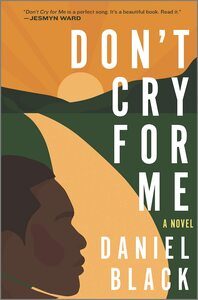Take a photo of a barcode or cover
emotional
funny
reflective
fast-paced
Plot or Character Driven:
Character
Strong character development:
Yes
Loveable characters:
Complicated
Diverse cast of characters:
No
Flaws of characters a main focus:
Yes
It’s been a long while since a book moved me to tears, but this did it. It’s a heavy, emotional read that was hard to get through at times (see the sexual assault warnings), but my my…what a story. One of the best books I’ve read this year.
Told in letters by a dying father to his estranged gay son. The father tells his son his history, his truth, the good and the bad. He was raised by his grandfather (a first generation free man). His brother died when he was 16 from illness, His grandmother died a year later from cancer. And it was just him and his grandfather and until he left to follow a girl to Nebraska where they married and raised their son. Jacob was not always a good father but he explains how he came to be. He just wants Isaac to know he tried. I didn't cry while reading this which surprised me. There's definitely plenty to cry at. But for some reason I missed that last emotional connection so 4.5 stars instead of 5.
emotional
reflective
medium-paced
Plot or Character Driven:
Character
Strong character development:
Yes
Loveable characters:
No
Diverse cast of characters:
Yes
Flaws of characters a main focus:
Yes
This was a great book. I'm not usually one for unlikable lead characters, but this story was compelling. It shows the journey of acceptance. I found this book to be profoundly moving. Furthermore, there was the importance placed on literature. I liked that the main character's mind was changed through reading from perspectives outside his reality.
emotional
reflective
sad
fast-paced
Plot or Character Driven:
Character
Strong character development:
Yes
Loveable characters:
Yes
Diverse cast of characters:
Yes
Flaws of characters a main focus:
Yes
This book was recommended to me by a friend, so I stepped into it blindly with a promise that I would really enjoy it. Written as a series of letters, Don’t Cry for Me sees Black father Jacob Swinton attempting to make amends with his queer, estranged son, Isaac.
The writing in this book is raw at times. The decision to write this book epistolary style, instead of a traditional chapter format, only enhances it and makes it feel more personal. It makes each of the letters feel as authentic as the memories they come from as opposed to a typical narrative style. Writing as letters also means that we only see things from Jacob’s point of view which takes us into his thoughts, feelings, and experiences, but also leaves us wondering how other characters experienced him, and not the other way around.
I didn’t like Jacob. It had nothing to do with him as a character, but more so with what he represented. On page one, Jacob states that there’s no redemption for a life like his, and throughout the book, he doesn’t seek any. Time after time, he realizes his mistakes; a lack of love or intimacy for those around him, not knowing how to express himself, or being downright mean for no reason because it's what he was taught or raised on. Jacob reminded me of my grandfather.
The open ending of the book left me curious, but not unfulfilled. I wondered if Jacob felt better about himself after his last letter. And Isaac…I found myself curious about Isaac. How did he feel about his father all these years? What was his reaction to finding this series of letters from a man who couldn’t even recall his age but somehow thought enough about him to write out his life’s story for him?
The writing in this book is raw at times. The decision to write this book epistolary style, instead of a traditional chapter format, only enhances it and makes it feel more personal. It makes each of the letters feel as authentic as the memories they come from as opposed to a typical narrative style. Writing as letters also means that we only see things from Jacob’s point of view which takes us into his thoughts, feelings, and experiences, but also leaves us wondering how other characters experienced him, and not the other way around.
I didn’t like Jacob. It had nothing to do with him as a character, but more so with what he represented. On page one, Jacob states that there’s no redemption for a life like his, and throughout the book, he doesn’t seek any. Time after time, he realizes his mistakes; a lack of love or intimacy for those around him, not knowing how to express himself, or being downright mean for no reason because it's what he was taught or raised on. Jacob reminded me of my grandfather.
The open ending of the book left me curious, but not unfulfilled. I wondered if Jacob felt better about himself after his last letter. And Isaac…I found myself curious about Isaac. How did he feel about his father all these years? What was his reaction to finding this series of letters from a man who couldn’t even recall his age but somehow thought enough about him to write out his life’s story for him?
challenging
emotional
reflective
sad
fast-paced
Plot or Character Driven:
Character
Strong character development:
Yes
Diverse cast of characters:
Yes
Flaws of characters a main focus:
Yes
dark
emotional
reflective
sad
tense
medium-paced
Plot or Character Driven:
Character
Strong character development:
Complicated
Loveable characters:
Complicated
Diverse cast of characters:
Yes
Flaws of characters a main focus:
Yes
emotional
hopeful
reflective
sad
medium-paced
Plot or Character Driven:
Character
Strong character development:
Yes
Loveable characters:
Yes
Diverse cast of characters:
Complicated
Flaws of characters a main focus:
Yes





